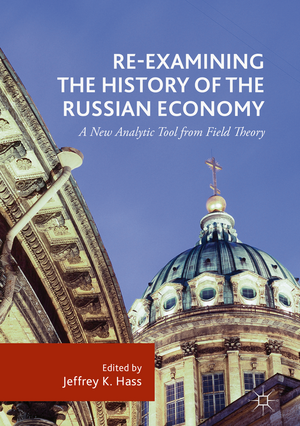Re-Examining the History of the Russian Economy: A New Analytic Tool from Field Theory
Editat de Jeffrey K. Hassen Limba Engleză Hardback – 28 iun 2018
With developed discussion of fields and field theory, this book moves beyond sociology to demonstrate to other disciplines the relation of fields and fieldtheory to other frameworks and methodological considerations for field analysis, as well as providing new empirical insights and narratives not as well-known abroad.
| Toate formatele și edițiile | Preț | Express |
|---|---|---|
| Paperback (1) | 728.60 lei 6-8 săpt. | |
| Springer International Publishing – 8 ian 2019 | 728.60 lei 6-8 săpt. | |
| Hardback (1) | 1120.81 lei 6-8 săpt. | |
| Springer International Publishing – 28 iun 2018 | 1120.81 lei 6-8 săpt. |
Preț: 1120.81 lei
Preț vechi: 1366.84 lei
-18% Nou
Puncte Express: 1681
Preț estimativ în valută:
214.47€ • 224.38$ • 178.16£
214.47€ • 224.38$ • 178.16£
Carte tipărită la comandă
Livrare economică 03-17 aprilie
Preluare comenzi: 021 569.72.76
Specificații
ISBN-13: 9783319754130
ISBN-10: 3319754130
Pagini: 380
Ilustrații: XIX, 374 p. 7 illus., 2 illus. in color.
Dimensiuni: 148 x 210 mm
Greutate: 0.79 kg
Ediția:1st ed. 2018
Editura: Springer International Publishing
Colecția Palgrave Macmillan
Locul publicării:Cham, Switzerland
ISBN-10: 3319754130
Pagini: 380
Ilustrații: XIX, 374 p. 7 illus., 2 illus. in color.
Dimensiuni: 148 x 210 mm
Greutate: 0.79 kg
Ediția:1st ed. 2018
Editura: Springer International Publishing
Colecția Palgrave Macmillan
Locul publicării:Cham, Switzerland
Cuprins
Chapter 1: Fields in Russian Economic History.- Part I: Fields of Discourses and Theory: Economics and Russia.-Chapter 2: Global Fields and Economic Theory: The Impact of German Scholarship on Russian Political Economy in the Eighteenth and Nineteenth Century.- Chapter3: Compulsion and Resistance: Origins of the Russian Research Tradition and Political Economy of the Special.- Chapter 4: Statistics Comes to Russia: Science, Quantitative Analysis, and Shifts in Economic Thinking.- Chapter 5: Networks, Fields, and Political Economy in Fin-De-Siècle Russia: The Life and Work of Nikolai Sieber.- Chapter 6: Fields of Discourse Perturbed: The Revolution of 1905 and Economic Teaching andThinking at St. Petersburg University.- Chapter 7: Repressive Fields: Economic theory in Late Stalinism and the Leningrad Affair.- Part II: Fields, Economic Policies, and Economic Practice.- Chapter 8: Empire, Orthodoxy, and Economy: The Influence of Russian Orthodoxy and Empire on Economic Fields in Pre-revolutionary Russia.- Chapter 9: State, Markets, and Fields in Russian History.- Chapter 10: Neil Fligstein’s Concept of Organizational Fields, Economic Processes and Dynamics, and Their Significance for Building Russian Markets.- Chapter 11: Economic Theory and a Constant Worry across Time: Institutional Failures in the Development of Theories of Inflation.- Chapter 12: Fields of Russian Finance: State versus Market.- Chapter 13: Fields in Flux: Post-socialist Reorganization of Property and Power.- Chapter 14: Structure in Bourdieu’s Fields and Realities of Contemporary Russia.
Notă biografică
Jeffrey Hass is Associate Professor at the University of Richmond, USA, and St. Petersburg State University, Russia. His areas of expertise are economic sociology, political sociology, political economy, social change, sociology of power, organizational sociology, and comparative/historical sociology. He has published on post-socialism, including Rethinking the Post-Soviet Experience: Markets, Moral Economies, and Cultural Contradictions of Post-Socialist Russia with Palgrave Macmillan in 2011. He is currently continuing this line of work on post-socialist political economy, as well as investigating the politics and practices of survival in the Blockade of Leningrad.
Textul de pe ultima copertă
This book explores the application of field theory (patterns of interaction) to Russian economic history, and how social and political fields mediate the influences of institutions, structures, discourses and ideologies in the creation and dissemination of economic thinking, theory and practice. Using focused cases on Russia's economy from the mid-nineteenth century to the present, Hass and co-authors expand the empirical basis of field studies to provide new material on Russian economic history. The cases are divided into two complementary halves: i) The role of fields of institutions, discourses, and structures in the development of Russian economic thought, especially economic theories and discourses; and ii) The role of fields in the real adoption and implementation of policies in Soviet and Russian economic history.
With developed discussion of fields and field theory, this book moves beyond sociology to demonstrate to other disciplines the relation of fields and fieldtheory to other frameworks and methodological considerations for field analysis, as well as providing new empirical insights and narratives not as well-known abroad.
Jeffrey Hass is Associate Professor at the University of Richmond, USA, and St. Petersburg State University, Russia. His areas of expertise are economic sociology, political sociology, political economy, social change, sociology of power, organizational sociology, and comparative/historical sociology. He has published on post-socialism, including Rethinking the Post-Soviet Experience: Markets, Moral Economies, and Cultural Contradictions of Post-Socialist Russia with Palgrave Macmillan in 2011. He is currently continuing this line of work on post-socialist political economy, as well as investigating the politics and practices of survival in the Blockade of Leningrad.
With developed discussion of fields and field theory, this book moves beyond sociology to demonstrate to other disciplines the relation of fields and fieldtheory to other frameworks and methodological considerations for field analysis, as well as providing new empirical insights and narratives not as well-known abroad.
Jeffrey Hass is Associate Professor at the University of Richmond, USA, and St. Petersburg State University, Russia. His areas of expertise are economic sociology, political sociology, political economy, social change, sociology of power, organizational sociology, and comparative/historical sociology. He has published on post-socialism, including Rethinking the Post-Soviet Experience: Markets, Moral Economies, and Cultural Contradictions of Post-Socialist Russia with Palgrave Macmillan in 2011. He is currently continuing this line of work on post-socialist political economy, as well as investigating the politics and practices of survival in the Blockade of Leningrad.
Caracteristici
Takes the concept of fields and field theory and applies them to economic history Demonstrates how to do a field analysis Grounds economic ideas and discourses in concrete structures and fields
